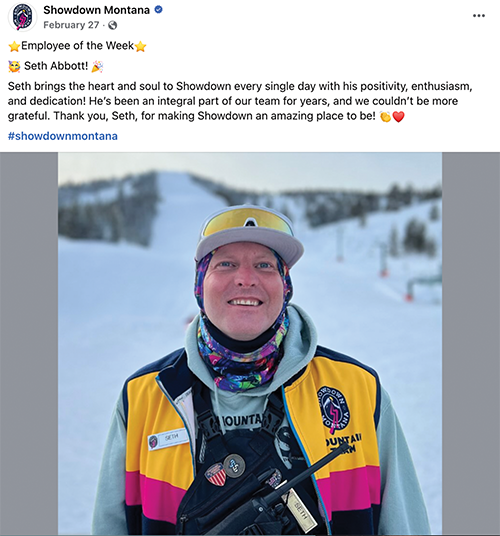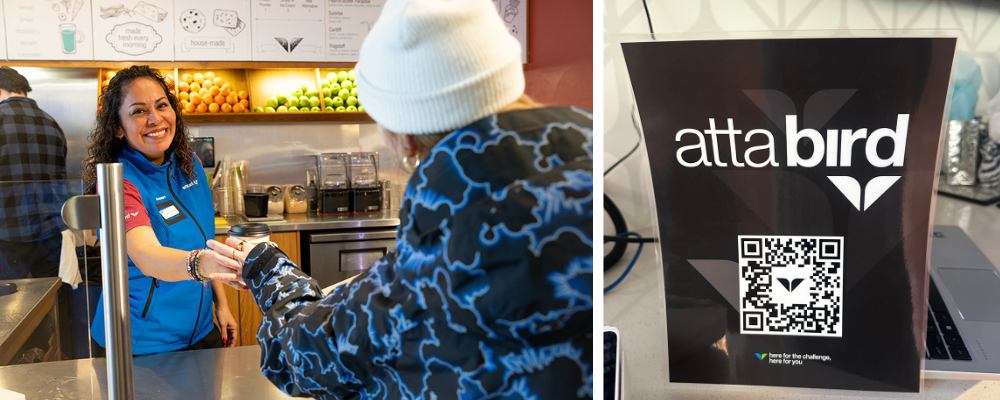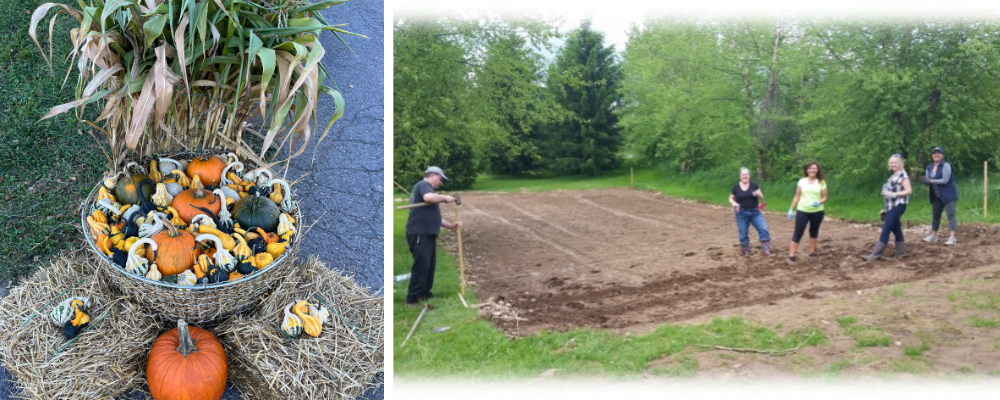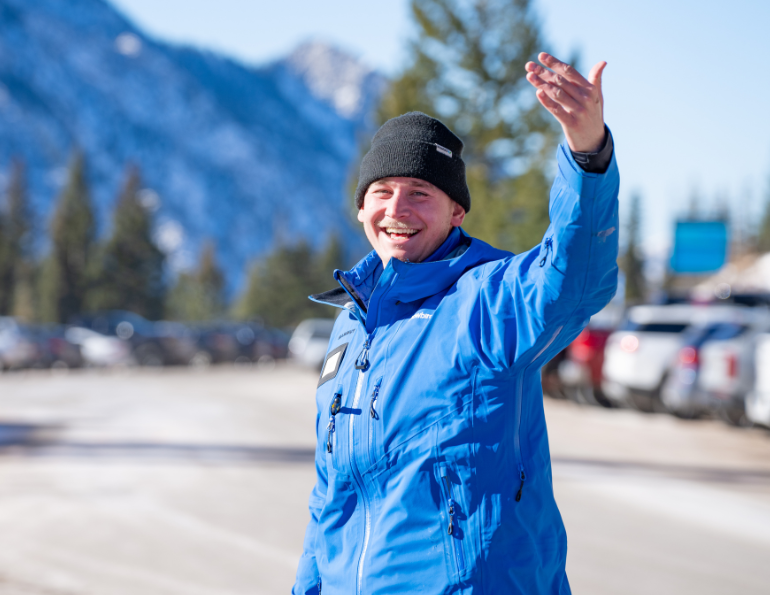A nice benefits package can help attract and retain talented people. But it takes more than a season pass and health insurance to make team members happy and feel satisfied about work, which should be the ultimate goal for employers. This is especially true for service-oriented businesses, like ski areas.
Numerous studies show a strong connection between employee happiness and customer satisfaction. People who enjoy what they do and like where they work are more productive and positive contributors to a strong company culture. They also provide better guest service, which in turn improves the guest experience and boosts customer satisfaction. And happy customers tend to spend more money and promote your business to others.
In other words, investing in things that make your people happy, satisfied, and motivated will produce a measurable return.
Over the summer, we asked you, our readers, to tell us about the benefits, recognition programs, and morale boosters your ski area offers. We greatly appreciate those of you who responded. Perks are only part of what makes people love to work at your ski area, of course—but the examples here can play a key role.
Recognition Programs
There are few more powerful motivators than being recognized for a job well done, and some ski areas take an especially Maslowian approach.
Your Best Self at Showdown
 The recognition program at Showdown Montana is part of a broader mission to help employees become their best selves.When Katie Boedecker became general manager at Showdown Montana in 2018, “she shifted the focus of customer service training from how to take care of a guest to how to love yourself,” says assistant GM Rickey Nash. Showdown has been training to that philosophy ever since and created a variety of different recognitions to honor staff who do great work and show up as their best selves every day.
The recognition program at Showdown Montana is part of a broader mission to help employees become their best selves.When Katie Boedecker became general manager at Showdown Montana in 2018, “she shifted the focus of customer service training from how to take care of a guest to how to love yourself,” says assistant GM Rickey Nash. Showdown has been training to that philosophy ever since and created a variety of different recognitions to honor staff who do great work and show up as their best selves every day.
Peer recognition. In Showdown’s High Fives peer recognition program, any employee can nominate any other employee. The nominee gets $25 in gift cards to Showdown or local business partners. Also, leadership selects an employee of the week each week in winter, which comes with $100 in gift cards, a social media post (see above), and a printout displayed in the lodge.
Annual awards. Showdown hands out about a dozen annual awards on closing weekend every winter. They include Rookie of the Year, Lift Operator of the Year, and so forth, as well as more unique awards, like the Stealth Bomber Award, for someone who’s rarely seen or heard, but makes a huge impact; the Growth Award, for the staff member who demonstrated the greatest personal and/or professional growth throughout the season; and the Sunshine Award, for the person who brought a positive attitude every day.
These awards all come with a cash prize ranging from $800 to $2,000 (Employee of the Year being the highest honor), and the winners’ names are added to a corresponding plaque displayed in the lodge.
Especially unique to Showdown is the Tunnel of Love Award, given to staff members who always showed up to the ski area’s traditional end-of-day employee lineup along the driveway, where they thank guests for coming (and play music, dance, hand out stickers, and help carry equipment). Three staffers were recognized last season, each receiving a 75-inch TV.
The power of love. While these financial incentives and recognitions are effective, love is the primary reason for Showdown’s excellent staff retention, happy guests, and a growing business.
“Our philosophy is to teach our employees to love themselves, that it’s OK to make mistakes, to grow, and to be a whole person,” says Nash. “When you treat an employee as a whole person, flaws and all, they feel valued for the person they are and not the work they produce. And when an employee feels they are valued as a human being, we find that they want to come to work, be on time and stay late to help; they want to work hard, and they want to do a good job.”
Attabird!
Snowbird in Utah recently developed a new peer recognition system that aims to become ingrained in the culture of the resort. It’s called Attabird.
“The Attabird program was designed to have multiple levels of recognition, some monetary and others more focused on building the culture of appreciation, and still more reinforcing positive employee performance in the name of improved guest service,” says resort guest services manager Sarah Reifsnyder.
Peer recognition. The peer-to-peer portion of the Attabird program is driven by a QR code that links to a Microsoft Form. The QR code “lives in every corner of the workplace” on stickers, magnets, posters, etc., says Snowbird’s Jacob Marquardt. Any employee can submit a recognition for any other employee by scanning the QR code and filling out the form. Each Attabird needs to be aligned with one of Snowbird’s core values, selected from a drop-down list in the form.
At the end of each month, the team that manages the program reviews, sorts, and organizes all the submissions. Everyone who received a recognition is sent their first two Attabirds via automated email. Additional Attabirds are emailed a few days later. This cadence provides employees with continued positive feedback from the month prior.
Monthly awards. In keeping with the goal of building a culture of appreciation, a single recognition isn’t directly tied to an incentive. However, monthly top performers—determined using a formula that considers the number of recognitions an individual received, how many different people submitted recognitions for that individual, and how many recognitions that individual submitted for others—do get awards. They have their choice of an individual prize (retail items, experiences, etc.) or a team prize, such as a pizza party or movie night, for the winner’s whole team. About 12 percent of the nearly 400 monthly winners chose the team prize in the program’s first six months.
Seasonal awards. More subjective quarterly and annual awards recognize staff who might not be as visible and thus might not get as many Attabirds, but have been given props for embodying one of Snowbird’s core values. The process for determining these includes assigning point values to recognitions and, with the names of the nominees redacted, a vote by the resort management team. Winners get lunch with general manager Dave Fields and other senior leaders as well as their choice of prizes, which can include a live-action photo shoot, new skis, a team outing off-site, and more.
 Left to right: Peer recognition reinforces positive performance in the name of improved guest service; For Snowbird’s (Utah) Attabird peer recognition program, a QR code brings staff to a form they fill out to give props to another staff member. Photo credit: Snowbird
Left to right: Peer recognition reinforces positive performance in the name of improved guest service; For Snowbird’s (Utah) Attabird peer recognition program, a QR code brings staff to a form they fill out to give props to another staff member. Photo credit: Snowbird
Instant Recognition
Several ski areas offer instant recognition programs in which managers, when they see a staff member going above and beyond, dole out dough that staff can spend at the resort. Killington, Vt., has “K Cash”; Wisp, Md., has “Ace’s Dough.” Wintergreen Resort, Va., offers “Wintergreen Bucks” in $10 coupons, and about $16,000 are given out to staff each year. Managers at Bridger Bowl, Mont., hand out gift cards to local businesses when they see exceptional work.
Brundage, Idaho, has a program called “shout outs” that works similarly. Instead of on-the-spot acknowledgment, though, staff members get a card detailing what they did (and a piece of candy) and are entered into drawings, which are done frequently, for prizes.
Discounts and Passes
Retail and F & B discounts for staff are common across the industry, ranging from 30-40 percent off at resort-owned retail shops to 10-50 percent off dining outlets. Of the ski areas we heard from, Killington offers the highest discount: 60 percent off food and 50 percent off alcohol.
Lodging deals are also common. Killington staffers get 25-40 percent off lodging. Showdown Montana offers seasonal staff discounts on stays at the ski area’s hotel, The Edith. Full-time year-round staff can stay for free.
Off-site deals. Several ski areas have coordinated staff deals with local businesses. For example, employees at Brundage get extended happy hour at a local brewery and $0.10 off a gallon at local gas stations. Schweitzer, Idaho, staff members get discounted mug club pricing at a nearby brewery, and a wine shop gives a discounted by-the-glass price, too.
“I can’t take credit for those local partnerships,” says Schweitzer HR generalist JJ Briggs. “It was actually a ski instructor that asked for us. That instructor made a lot of friends.”
Pass benefits. Since not every household is the same, Showdown reconsidered its free season pass (and rentals, lessons, and programs) benefit for staff. “We used to say this benefit was for spouses and dependents, but that only benefited employees with a traditional family structure,” says Nash. “So now we just say, ‘those closest to you,’ so every employee has the chance to share the mountain with their closest people.”
Wellness
Ski areas have been more thoughtful and creative about the benefits related to mental and physical health in recent years. Many now offer employee assistance programs with free counseling services, which was uncommon a few years ago.
Wellness walks and a garden. During the non-winter months at Wisp, the HR team coordinates monthly group walks around the resort followed by a hosted lunch. These typically draw 100-150 staff. Wisp has also harnessed the meditative value of gardening since 2017. HR manager Wanda Mayle encourages staff to help tend to—or just visit and enjoy—a large “Employee Wellness Garden” with veggies, unique pumpkins and gourds, fall ferns, and more than 150 different types of flowers. The bounty is shared with staff members.
Yoga and more. Bridger Bowl and Schweitzer offer staff free wellness classes such as yoga, strength training, or yogalates. Bridger Bowl also provides free physical therapy for staff during the winter.
 The staff at Wisp, Md., help tend the Employee Wellness Garden, whose bounty is shared with staff members and used for decor around the resort (left). A showcase for more than 150 varieties of flowers, the garden is also a relaxing place to visit. Photo credit: Wisp.
The staff at Wisp, Md., help tend the Employee Wellness Garden, whose bounty is shared with staff members and used for decor around the resort (left). A showcase for more than 150 varieties of flowers, the garden is also a relaxing place to visit. Photo credit: Wisp.
Mammoth Mountain: Leveraging Team Members’ Skills
In addition to free yoga classes, Mammoth Mountain, Calif., has a variety of unique staff wellness programs that leverage the talents of existing team members and the resort’s relationship with the local hospital.
A strength and mobility class is held twice a week in the winter, taught by a Doctor of Physical Therapy as part of Mammoth’s contract with the hospital. This season, Mammoth is adding a self-defense series, dance class, and couch-to-5K-type program. Attendance is tracked and staff who attend 12 classes a month are awarded with two points on their pass. Each point is worth $20 in resort cash, or a lift ticket for a friend.
Athletic trainer. The resort started a “wildly successful” athletic trainer program through the hospital last winter. Individuals with on-hill jobs can book time with the trainer, who has an office on-site, to help overcome pain or continue recovery from an injury that hinders their ability to perform their jobs. “One ski patroller said this program was the single best benefit they’ve ever seen us offer and that it gives them hope for being able to patrol for years to come,” says health and safety manager Jenny Weaver.
The arts. In addition, Mammoth’s “Substance-free Stoke” series includes art classes and even some journaling and writing classes, all taught by staff members. The resort buys pizza and supplies and provides the space. Finding instructors isn’t too difficult, says Weaver: “Our diverse employee base has so many talented people.”
Other Cool Benefits
We also heard about some less-common employee perks.
Carpool matching. One of these is Brundage’s carpool matching and incentive program, which compensates the driver and matches drivers with folks who need a ride. Employees sign up by scanning a QR code posted in shared employee spaces. This online system is where people find matches to carpool with and where drivers input their mileage. The carpool incentive for drivers is a calculation of standard miles per gallon and the price of regular unleaded fuel. It is calculated each pay period and added to the drivers’ paychecks.
“The carpool incentive has grown and become supported by the sustainability department as a major opportunity for reducing greenhouse gas emissions,” says employee services manager Rachel Wessel.
Schooled. Another neat benefit is Killington’s tuition reimbursement program. Any full-time Killington staffer is eligible to be reimbursed for tuition they pay for college courses that are directly related to the skills and knowledge required by their current job or that will help them develop their career path at Killington. They simply submit a request to their department manager for approval to be reimbursed for the cost of the course.
Vacation pay. Finally, one from Silver Mountain, Idaho, retail manager Bill Luciani, who used to work at a ski shop in Bend, Ore., where the now former owner would pay his staff time and a half for all vacation hours they accrued. When Luciani asked why he did it, the owner said, “I don’t want my employees to be boring on their vacation. I want them to have some extra money so they can really have fun.”





